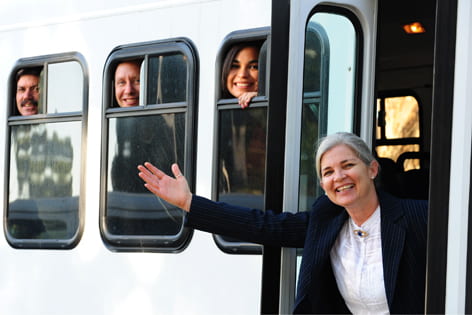State lauds UCI’s transportation program
Parking & Transportation Services at UC Irvine has earned the state’s most prestigious environmental honor – a 2008 Governor’s Environmental and Economic Leadership Award – for its efforts promoting green commuting and public transportation.

Parking & Transportation Services at UC Irvine has earned the state’s most prestigious environmental honor – a 2008 Governor’s Environmental and Economic Leadership Award – for its efforts promoting green commuting and public transportation.
Gov. Arnold Schwarzenegger recognized UCI’s Sustainable Transportation program in the Climate Change category, which rewards innovative approaches to reducing greenhouse gas emissions and limiting adverse effects of climate change. The recognition was awarded on the strength of a variety of UCI programs, including public transportation incentives, energy-saving fluorescent lighting for parking structures, optimized traffic signal timing, carpools and car sharing, vanpools, biodiesel-powered shuttles, and improved pathways that help promote biking and walking.
UCI’s Sustainable Transportation program impacts are both significant and measurable: Its initiatives reduce greenhouse gas by 18,600 tons and save $21 million in fuel, vehicle and construction costs each year. They also cut about 40 million commuter travel miles annually.
Stacey Murren, Parking & Transportation Services director; Ron Fleming, associate director; and transportation coordinators Mike Davis, Ken Ezell and Antoinette Saenz of the Sustainable Transportation team discuss the award and their efforts to help keep UCI green.
Q: What does this award mean to you?
Davis: It’s rewarding to know we’re going in the right direction and our cutting-edge programs are making a difference. It encourages me to keep trying new things. The award is just a capstone of what’s been done here the past 20 years, thanks to Stacey and Ron.
Murren: We’re all optimists. If we weren’t, I don’t think we would have been able to achieve what we have. The end goal of saving the planet is really what we’re all about. Everything we do is focused on making the university and Southern California a better place.
Q: What are some of the approaches you’re taking to continue to focus on sustainability?
Ezell: A focal point in our department is partnering with other agencies like the South Coast Air Quality Management District, which helps our area improve its air. Going green can be a hard transition because there is financial obligation and sacrifice. But it is rewarding to change your mindset and work with a group like the AQMD; its goals benefit us all.
Murren: Our goal right now is status quo – we want to keep the number of vehicles the same, even as the campus population continues to grow in the future. We’re concentrating on finding alternative ways for people to come to campus with others instead of driving alone.
Q: The Sustainable Transportation program has had many successes. What are the accomplishments of which you’re particularly proud?
Fleming: For me, it was traffic signals. We went from four intersections with signals to eight in about a year. The four were all set to one timing sequence, even though it’s possible to program each to work on any number of schedules. We collaborated with the Institute of Transportation Studies, did our own analysis of the overall traffic plan, and adjusted the timing so that drivers can save a lot of time negotiating campus roadways. The new plan aims to limit car stops and starts, which cause emissions.
Saenz: The annual AQMD surveys tracking the average number of employees in each vehicle traveling to campus are my niche. I love getting out there, talking to my coordinators and getting everyone focused and in the right mindset to collect a lot of surveys.

